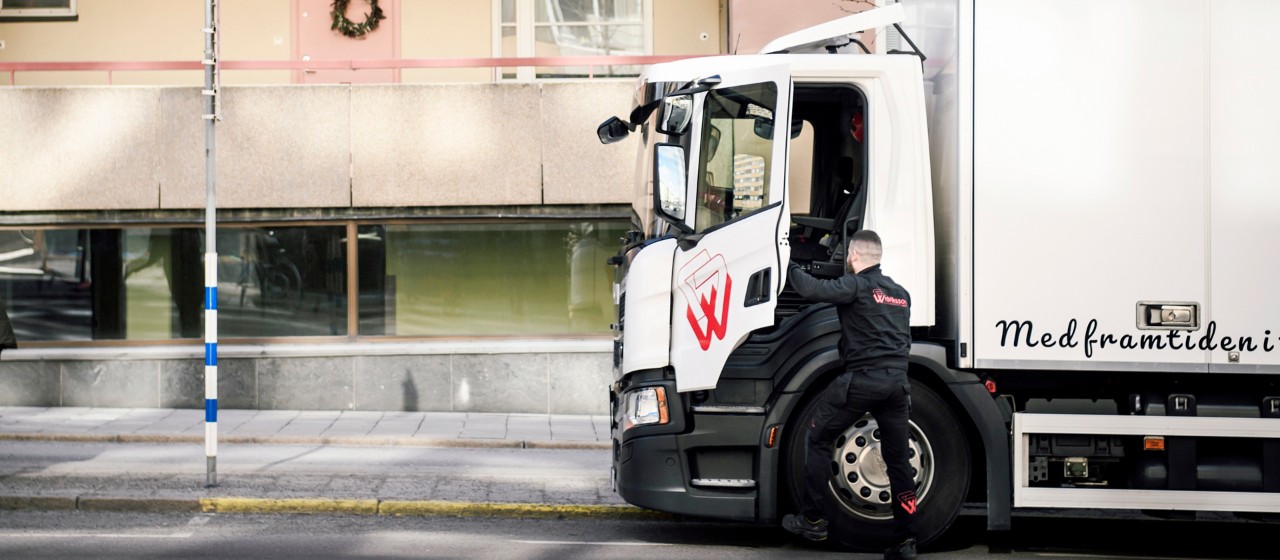
Fossil-free Widriksson Logistics strives for a positive climate footprint
14 JULY 2021
After ten years at the wheel of distribution trucks in Poland and Sweden, Maciek Meszek has mastered the challenges of city driving. But now he’s also helping to meet one of the city's - and the world's - future challenges, driving a new Scania P 280 that’s powered by compressed biogas.
Maciek Meszek drives for Widriksson Logistik, whose primary areas of activity are Greater Stockholm and Gothenburg. With its 120 vehicles, the Swedish haulier transports loads for customers such as Coop, IKEA and the Stockholm Region authority.
It’s a highly competitive business but the logistics company’s trump card is a completely fossil-free fleet: every one of its vehicles are powered by HVO, electricity or biogas. The company also has its own HVO and gas tanks at its base in the Stockholm suburb of Västberga, which means that it can guarantee clean biogas without any mixing of natural gas whatsoever.
“We have come further than many others in addressing the environmental issue,” says Widriksson Logistik’s CEO Johan Nyblom.
“By securing the biogas supply with our own tank, the fuel is fully traceable. We can state with certainty that it is produced entirely from waste that is generated in Stockholm County. We get a circularity in the flow and we have full control over what is in our vehicle tanks.”
Maciek Meszek drives the gas truck for daily transports of infectious and biological waste from the large hospitals in the Stockholm Region to Vattenfall's incineration plant in Uppsala, 70 kilometres to the north. The weight of the load is relatively small but the goods are bulky and these are sensitive materials.
“I usually refuel the car about every other day,” says Meszek. “It only takes between five and seven minutes, and you don’t have to refuel AdBlue, either. What I really appreciate is the quieter operation of the gas truck compared with a diesel one.”
Early environmental commitment
Widriksson Logistik was founded in the early 1950s by Henry ‘Putte’ Widriksson, who drove transports for the Swedish newspaper Aftonbladet, using an American Fargo truck. The haulier kept this customer for more than 40 years. Later, when Widriksson Logistik expanded under new ownership, it became an early adopter of environmentally-friendly transport operations, with its first biogas vehicle going into service as early as 2006.
“The owners realised early on that they should move towards becoming sustainable,” explains Johan Nyblom.
Actually, the owners’ vision was that the company, which was founded in 1953, would still be around in 2053, and they understood that sustainability would be a key factor. That focus on environmental technology has only accelerated in recent years because customers, consumers and society all require transport businesses to be much more sustainable.
The company has already come far in its green journey, but it is not content with having achieved a completely fossil-free vehicle fleet. In fact, it wants to make a positive climate impression by 2030.
“We want to be at the forefront. We are not content with being fossil-free in our transports. We want to be a role model, so it is not only about reducing our direct CO2 emissions, but also about other environmental impacts caused by tyres, vehicle washing and resource consumption for consumables,” says Nyblom.
Sustainable driving
Johan Nyblom also emphasises that sustainability not only includes vehicles and fuel but road safety and social issues, too.
“Our commitment to our drivers is also part of our sustainability work. We want the people who drive for us to embrace our values. It is also about sustainable driving and how you behave in traffic.”
In the cut-throat world of distribution in Stockholm, Widriksson defends collective wage agreements and fossil-free transport, but not all follow suit.
“Unfortunately, this does not apply to a sufficient extent in the industry, which can distort the competition. We have to invest in the conversion to sustainable fuels, which means, among other things, that our costs are 8 to 10 percent higher compared with conventional solutions. We need to persuade more of our customers to share in these investments. Our customers and their customers must realise that fossil-free deliveries have clear added value.”
Amid the technology shift
For Widriksson Logistik, being in the middle of a technology shift between internal combustion and electric engines is not easy. The company is investing in a young fleet and this investment has to be carefully planned and implemented. It has started to put its first electric distribution vans into operation but this process is being hampered by limitations on the load weight, the power for cooling units and the range over which the vans can be driven.
“Electrification will come, but for the foreseeable future the vehicles will be a hybrid combination of electric and renewable fuels. We constantly have to make sensible trade-offs,” says Nyblom.
“We do believe that electrification will be adopted more widely in time to come, but biogas and HVO will continue to play a crucial role in accelerating the conversion of the Swedish vehicle fleet as a whole.”
And, he adds, “It is important not to get stuck on technological development. Vehicle manufacturers must continue to offer a wide range of alternatives, and politicians must ensure a long-term perspective in the taxation of various fuels.
“Biogas gets too little space for development when everyone is waiting for electrification. It’s important to maintain the breadth of the range of solutions. It’s simple to imagine that the future is only about electrification, but biofuels are good and they should be developed further. In addition, the technology is constantly evolving and there will be new opportunities appearing on the fuel side.”